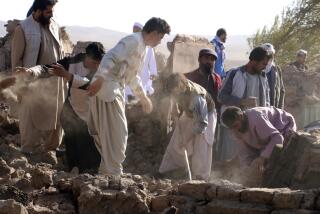The curse of Kandahar
Even before the jet lag had worn off after a visit to Kandahar earlier this year, I received a disturbing e-mail from a colleague there. An improvised explosive device had detonated outside the home of one of the members of the cooperative I help run. It had apparently been placed to target a convoy in which the district chief of police was traveling.
Unharmed but outraged, the police chief ordered his subordinates to find out who owned the house. When my Afghan co-worker and his brother opened their gate, they were beaten and sworn at repeatedly, then hauled to police headquarters, where they spent the night.
There was no evidence to suggest that the men had buried the IED, and every reason to think they hadn’t. Between them, the brothers have many small children who might have been hurt in the explosion, and neither has ties to violent groups.
Fortunately, my friend and his brother were released the following day, but only because of personal connections. Afterward, they cleared their house of anything that could be construed as a weapon, fearing that anyone who had it in for either of them could peg them as insurgents.
They were taking a gamble. Weapons are common in Afghan homes, in part because they are needed for protection against Taliban insurgents who regularly threaten ordinary citizens, particularly those who work for the Afghan government, NATO’s International Security Assistance Force or foreigner-initiated organizations like our cooperative. For this reason, all members of our cooperative, which manufactures skin care products from locally grown fruits and flowers, are potential targets.
In the months after President Obama was sworn in and before the Afghan election of August 2009, many of the Afghans with whom I communicate regularly dared to hope that the new U.S. president would help bring about change in Hamid Karzai’s administration. They applauded the way in which Obama immediately distanced himself from the Afghan president and condemned the rampant corruption that plagues the country. Finally, they thought, the international community might be able to compel Karzai to deliver the kind of responsible governance and rule of law that people craved. But when those same officials wilted in the heat of an Afghan election so fraudulent that more than a million votes had to be disqualified, my friends became despondent. “Afghanistan is going in the river,” one of them declared. “We are swimming now.”
Next came the Marja offensive, followed by a troop buildup for the much-publicized Kandahar operation. If ever there was a moment when it would seem as if Kandaharis would want to distance themselves from the loathsome Taliban and rally around their government and the formidable NATO forces that were ramping up to support it, this would be the time. Instead, more people than ever before seem to be joining the insurgency.
Why? Because for all the talk about tackling corruption, including the “governments in a box” the U.S. promised to deliver, Kandaharis have yet to experience any noticeable improvements. The infamous Ahmed Wali Karzai — the president’s half brother, who has been publicly accused of all kinds of corruption, including opium trafficking, land confiscation and employing insurgents for his own advantage — is still running the province and much of the region as if they were his personal fiefdom. He still largely controls the appointment of officials, who then preside over an appalling system of patronage, protections and punishments. Worse still is the fact that ordinary citizens have to watch Wali Karzai and others of his ilk get showered with American dollars to provide private security, logistics, construction materials and intelligence.
People in the West tend to view corruption as something of an abstraction. But after six trips to Kandahar in the last three years, I’ve seen how favors are doled out as a form of patronage or in response to bribes. These are not victimless crimes. Every day, citizens face annoyance, expense and sometimes genuine trauma at the hands of corrupt officials. They are refused passports until they cough up half a month’s salary in bribe money, or are forced at ruinous expense to produce documentation that proves they own their land to prevent it from being confiscated or avoid being hauled off to jail for no good reason. Everybody I have met in Kandahar has an impressive portfolio of such stories, and they are all exhausted from navigating an endless stream of humiliating abuses.
The people of Kandahar are caught between abusive governance and a lethal insurgency, and they are waiting for some indication that the Americans will do something more helpful than play warrior and build enormous, air-conditioned mansions with bulletproof windows for greedy Afghan officials. In April, when I last visited, nobody even wanted to talk politics — that was too depressing. Now, when we talk over a bad Skype connection, my friends first rattle off a list of the most recent bombings and assassinations and then tell me that daily life in Kandahar is continuing on as usual.
To the Afghans I work with, it makes no difference which general runs the war, or how many of our troops get deposited on their soil, or even how many bad guys we kill. They won’t trust the United States as long as it continues to cast its lot with corrupt politicians who profit shamelessly from the abusive governance that is driving so many of their countrymen into the Taliban’s winning arms.
Hearts and minds? I don’t suspect we’ll win too many of those until we take the lead in stepping out of the patronage game by refusing to play nice with gangsters.
Jennie Green is the director of North American operations for the Arghand Cooperative in Kandahar.
More to Read
Sign up for Essential California
The most important California stories and recommendations in your inbox every morning.
You may occasionally receive promotional content from the Los Angeles Times.










